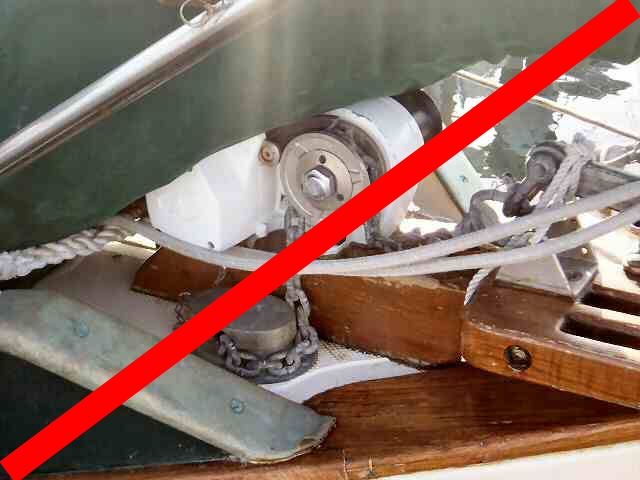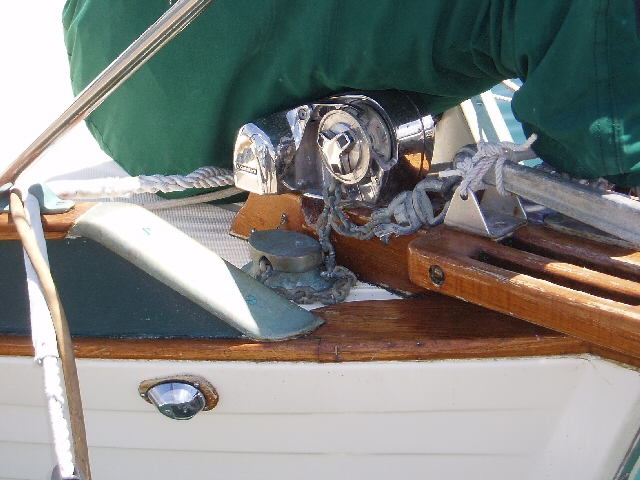
Before I started on the install, I had to do the wiring. I replaced the main switch. The teak panel is shown here.
| HOME | Outfitting Guenevere | Contact
us |
Our DVDs |
Video Shorts |
| Short
Hops (Local Bay area cruises) |
Our Plans and Tracking | Our Position
Reports with photos |
Guenevere's Reading Room |
Links we like |
UP THAT ANCHOR!
(Note: You can click on any photo for a larger view. Then use your browsers back button to get back to this page.)
For a long time my wife Jill and I have been undecided about what windlass, if any, we wanted to have aboard Guenevere. For a LONG time we were thinking about getting a manual windlass. We were going in that direction as we thought that a manual would be more reliable. But then we heard a few stories of even manual windlass going bad.
I think the deciding factor came from a LOT of reading about boats out there. It seems that a LOT of the books had at least one story about having to re-anchor at least a couple of times during the night when the wind was picking up and other boats were starting to drag.
Our thinking came to the idea that if we went manual, we might wait before we started to reanchor. Or, we might be exhausted if we had to do a re-anchor a number of time during a few hours.....
The next, and final thing that swung us over to a power windlass, (not counting our age) is that the one we bought has a manual mode! If the motor stops, we can put on a handle and it now works as a manual unit!
So, here is the install we did....

Before
I started on the install, I had to do the wiring. I replaced the main
switch. The teak panel is shown here.

I
made a new switch plate and installed the windlass circuit breaker
below it. As long as I was working the wiring, I replaced the "1,
2 or both" switch with three on/off switches. This shows the new
panel in place. That is the engine shutdown knob above it. By not
putting that in the cockpit, it lasts a lot longer. No salt water
gets in to the cable.

One
of my main goals was to be able to keep the mooring bit. This is how
it looked before I started.

This
is the inside of the anchor locker, split by sunbrella material. I
had to remove all the chain so I could put in the wiring. By the way,
I split an old fender and put it along the hull sides to protect them
from the chain.

The
Windlass base was wider than the old bow sprit. A view of the teak
board I have to add to install the windlass.

The
bolts (threded rod) that came with the windlass were not long. I had
to cut down the original bow sprit so the windlass bolts would fit.
This also made it the width as the new board.

I
then cut the new teak to fit next to the old sprit.

This
is a view of the windlass resting in place. I would put it in place
and check the fit after every cut.

The windlass in place with the teak rough cut and in place.

As
I was installing the windlass a friend stopped by to take a look at
all the work I was doing. He then had his lunch in front of me!
Didn't even offer to share.

I
then cut away the rear of the old sprit to allow the bit & bit
wood to fit in.

A view of the new teak in place and carved to fit. The first coat
of finish put on.

The
bit in place with a lot of sealant. The dark line forward of the port
pipe is from an old fastener. The cut out in the teak board in the
Stbd. side feeds the chain into the pipe.

The
Windlass is in place with sealant. You can also see the fordeck
control.

On the 4th of July 2002, we anchored at Richardson's Bay. The pay
out worked great! If you look close you can see one blue
stripe
on the chain. That means we have 66 foot down. We were in 10 foot of
water +/-. We now put out more than required (if we have the room) as
it's so easy to get back in!

As
you can see, it worked well..... ;-)
This is from Treasure
Island bottom. Another plus for the windlass, our hads were still
clean!

This
shows the one mod I did to the windlass. If you are using 250 foot or
less of chain in one half of the locker of a Nor'Sea you will not
have to remove the loop the chain goes through. Email me for details
on this if needed.
We have used it a number of times and it's working very well.

Shortly after we did our 2005 gear
report, the windlass STOPPED
pulling the anchor up. Last time I checked, that was the only reason
for a windlass.
The symptoms were that the
anchor would fall just fine, but
would not come up. Also, the circuit breaker would NOT pop. That is,
the windlass was not overloaded.
I wound up troubleshooting by
opening the anchor
locker, cutting the power leads and going directly to a small
motorcycle type
battery. It still did not work.
I called the support line and
the first thing the guy said
was that I must have overstressed it. NOT ONCE did I leave the anchor
set
without the manual stop set. I NEVER allowed the boat to ride to the
anchor
just on the windlass!
As it turned out, inside the
unit is a roller bearing that
only spins one direction. I did not know they made such a
thing! That bearing
had gone bad. The design is that this is what stops the anchor from
falling
until the switch is made. In my opinion, this is very poor
engineering!
I once again called, and you
cannot purchase just that bearing.
Naturally, you have to get the kit with ALL of the unit’s
bearings. And oh, by
the way, that bearing MUST be pressed in and out. And, it MUST be
pressed in
the correct way!
The outcome is, we were trying to go out and it was faster, better and cheaper to just replace the windlass! So, that is what we did. We now have a Lewmar Pro-Series H700.

When I talked to Sampson
Lowrance, I was told that they no
longer sell windlass. I said I was happy that Lewmar bought them out. I
was
informed that it was the other way around and that the Lewmar name was
kept
because it was better thought of!